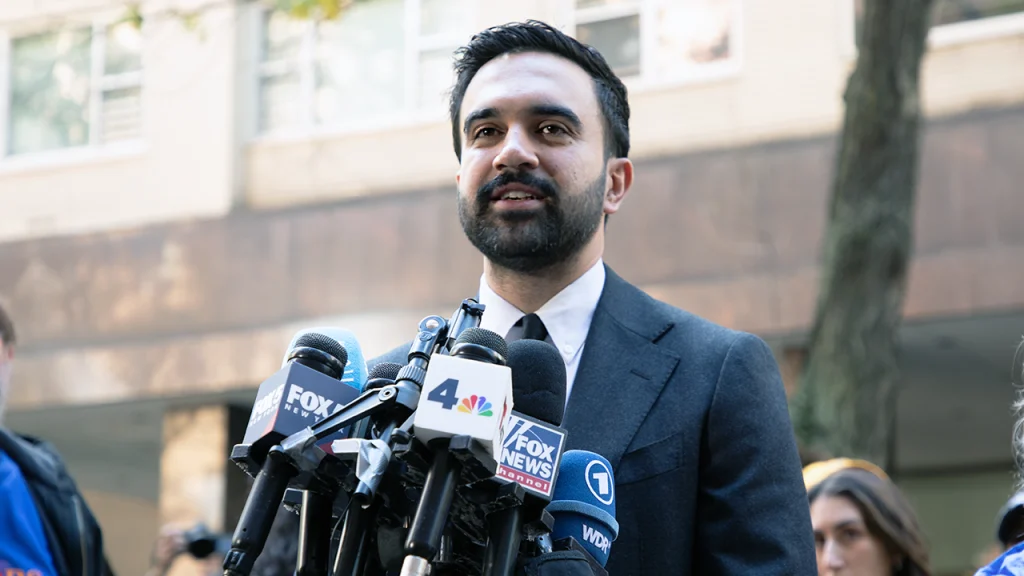NYC Mayoral Candidate Clarifies Controversial 9/11 Anecdote Amid Scrutiny
New York City socialist mayoral candidate Zohran Mamdani found himself at the center of a heated controversy this week after sharing an emotional story about his “aunt” who reportedly stopped using the subway following 9/11 due to Islamophobia. The anecdote, delivered during an October 24 speech where Mamdani fought back tears, was meant to illustrate the impact of anti-Muslim sentiment in post-9/11 America. “I want to speak to the memory of my aunt who stopped taking the subway after September 11th because she did not feel safe in her hijab,” he told the crowd, connecting this personal story to his broader concerns about Islamophobia. However, the story quickly attracted scrutiny when social media users and conservative critics began questioning its authenticity, particularly when it was discovered that Mamdani’s biological aunt, Dr. Masuma Mamdani, appeared to have been living in Tanzania during the relevant time period according to her LinkedIn profile, and public photos didn’t show her wearing a hijab.
Facing mounting questions about the veracity of his story, Mamdani offered a clarification on Monday, explaining that he had been referring to Zehra fuhi, his father’s cousin who has since passed away. The term “fuhi,” as reported by the New York Post, means paternal aunt in Hindi and Urdu, suggesting that while not his direct biological aunt, this was a family member he considered an aunt in cultural terms. This clarification came after the controversy had already gained significant traction, including a critical post from Vice President JD Vance who wrote on social media: “According to Zohran the real victim of 9/11 was his auntie who got some (allegedly) bad looks.” The exchange highlights the increasingly contentious nature of the New York mayoral race and the scrutiny that candidates’ personal narratives receive in today’s digital age.
The controversy extends beyond just this single anecdote, as critics have also begun examining Mamdani’s family background more broadly, particularly his father Mahmood Mamdani’s controversial statements as a Columbia University professor. The elder Mamdani has faced criticism for past claims, including an assertion that Hitler was inspired by Abraham Lincoln, which recently resurfaced on social media. Additionally, Mahmood Mamdani serves on the advisory council of an anti-Israel organization supporting boycotts and sanctions against Israel and has frequently accused the Israeli government of committing “genocide.” In his 2004 book “Good Muslim, Bad Muslim: America, the Cold War, and the Roots of Terror,” he wrote controversial statements including: “Suicide bombing needs to be understood as a feature of modern political violence rather than stigmatized as a mark of barbarism,” adding that “we need to recognize the suicide bomber, first and foremost, as a category of soldier” – statements that have now been scrutinized in the context of his son’s candidacy.
Zohran Mamdani’s mayoral campaign has increasingly focused on issues of religious identity and discrimination, with the candidate suggesting that criticisms of his anti-Israel positions are rooted in anti-Muslim bigotry rather than substantive policy disagreements. In a post on social media platform X that garnered at least 24 million views, Mamdani wrote: “The dream of every Muslim is simply to be treated the same as any other New Yorker. And yet, for too long, we have been told to ask for less than that, and endure hatred and bigotry in the shadows. No more.” This framing of criticism as primarily motivated by religious prejudice has itself become controversial, with opponents arguing that legitimate policy disagreements are being deflected through claims of bigotry, while supporters maintain that Muslims in American politics face disproportionate scrutiny and prejudice compared to other candidates.
The incident illuminates the complex intersection of personal narratives, identity politics, and campaign messaging in modern American elections. For many voters, Mamdani’s story resonated as an authentic reflection of the real discrimination many Muslims faced after 9/11, when hate crimes against those perceived to be Muslim rose dramatically across the country. For others, the questions about the specific details of the story raised concerns about the candidate’s credibility and willingness to potentially embellish personal anecdotes for political effect. The controversy also demonstrates how quickly personal stories can be scrutinized in the digital age, with social media users able to rapidly investigate and challenge claims made by public figures, sometimes leading to clarifications or modifications of earlier statements.
As the New York City mayoral race continues, this controversy highlights the broader tensions within American politics around issues of identity, religious freedom, foreign policy (particularly regarding Israel and Palestine), and the boundaries of legitimate political discourse. For Mamdani, whose campaign has embraced progressive and socialist policies while criticizing establishment politics, these discussions about his personal narrative and family background have become intertwined with debates about his policy positions. Whether voters will ultimately focus more on the substance of his platform or the controversies surrounding his statements remains to be seen, but the incident demonstrates the increasingly personal nature of political campaigns and the challenges candidates face in sharing personal stories while under intense public scrutiny.


